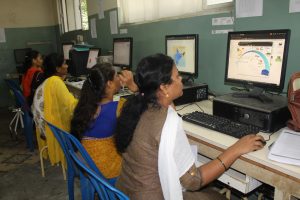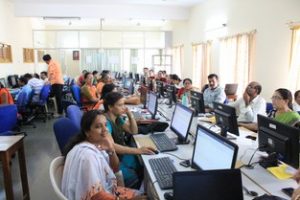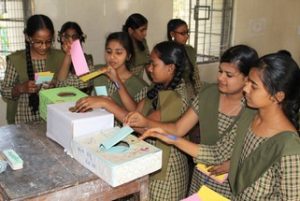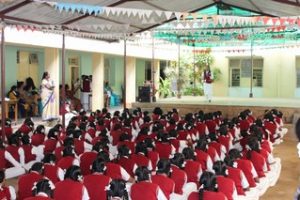ICTs and Education
The promise of digital technologies lies, in large part, in their ability to empower the peripheries. In the context of education, this means empowering not only marginalized groups but also teachers. The use of Information and Communication Technologies (ICTs) to enhance content and pedagogical knowledge, create and share open educational resources, and support constructive classroom engagement goes a long way in the professional development of teachers. The use of free and open digital technologies also creates a free and open learning environment, where teachers see themselves as active participants in a digital society, and not merely as users or consumers of content.
IT for Change’s (ITfC) work on education continues to focus on demonstrating and maturing models of technology integration that strengthen the agency of teachers and the autonomy of schools in the public education system. In 2019-20, we continued to make classroom processes more democratic and participatory, build teacher networks, and develop collaborative resource repositories. We also made progress toward informing education policy and discourse.
Teacher professional development
As part of ITfC’s continued association with the Regional Institute of English, South India (RIESI), we conducted workshops that equipped participants of the Post Graduate Diploma in English Language Teaching (PGDELT) program with the capacity to develop digital materials for teaching and learning. In similar workshops conducted for three batches of RIESI’s Certificate Program in English Language Teaching (CELT), participants learned how to create and develop digital materials using free and open source software (FOSS) audio editors.
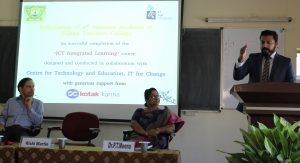
We continued the ICT Integrated Learning course, which focuses on how digital technologies can be applied in education, for the 2018-20 batch of student-teachers at Vijaya Teachers College (VTC). The same course was also initiated with the 2019-21 batch of B. Ed. students at the same college.
In collaboration with VTC, we conducted a five-day certificate course on ICT Integration in Teaching for student-teachers from B. Ed. colleges across Bengaluru, introducing them to a variety of generic and subject-specific software applications to develop lesson plans and other resources.
ITfC entered into a Memorandum of Understanding with Sri Sarvajna College of Education (SSCE), a reputed institution in the area of teacher education, to offer pre-service programs for student-teachers and teacher-educators. As part of this collaboration, two-day workshops on integrating ICT in pre-service teacher education were organized for B. Ed. students at SSCE and RV Teachers College (RVTC).
Work with school systems
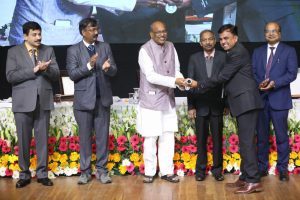
Gurumurthy Kasinathan was invited to become a member of the Academic Council of the Karnataka Residential Education Institutions Society (KREIS), one of the highest autonomous academic bodies of the state’s Social Welfare department that runs schools for children from socially marginalized backgrounds. He was part of deliberations to develop an academic plan for KREIS schools.
ITfC designed and conducted an orientation session for 85 KREIS teachers — under our ICT Integration in Teaching program — aiming to equip them as Master Resource Persons (MRPs), who, in turn, will train other teachers.
Over the past year, the ITfC team designed, organized, and conducted several other workshops, including:
A workshop for head teachers of 100 schools on digital tools and methods for classroom teaching, in collaboration with Kristu Jayanti College.
A workshop for college teachers across the country on concept mapping and video resource development at Ramanujan College, Delhi University.
A workshop to support the RIESI faculty in developing new open-access (for the public) certificate courses.
Training on Geogebra and H5P software applications for mathematics and English teachers from government schools in Telangana.
OER development in Indian languages Open Educational Resources (OER) are a critical part of imparting high quality and inexpensive education. Unfortunately, most OERs are available only in English. To fill this knowledge gap, we had started integrating the development of OERs in Indian languages as a component of our teacher development programs, with support from Kotak Mahindra Bank CSR. During 2019-20, 15 articles on language and language teaching were translated into Kannada from English, as part of a collaboration with Azim Premji University. Most of these pertain to ITfC’s language teaching work while others focus on designing a language policy in education. Our collaborations with other teacher-education institutions also contributed to the creation and publication of OERs. Overall, 102 resource pages and 298 files were created and published on the Karnataka Open Educational Resources (KOER) in the past year.The ITfC team also translated important components of the Moodle Learning Management System (LMS) user interface into Kannada, so that Kannada-speaking student-teachers, teachers, and teacher-educators could access e-learning courses on Moodle.
A Wikithon was conducted for the student-teachers of VTC to translate articles on English Wikipedia into Kannada. As part of this initiative, 20 articles were published by teams of student-teachers on the Kannada Wikipedia.
Teachers’ Communities of Learning program with Bengaluru schools
ITfC continued to engage with teachers through the Teachers’ Communities of Learning (TCoL) program in Bengaluru South district. Supported by the Cognizant Foundation, the program aims to strengthen participatory learning and student engagement through contextualized teaching. This involves:
Conducting school/classroom demonstrations for mathematics, Kannada, and digital learning in select schools.
Documenting these learnings and creating e-content for wider dissemination through the KOER portal.
Conducting block level workshops for mathematics and Kannada teachers and head teachers, and enrolling them into an online community of learning.
ITfC actively works to mainstream the resources, experiences, and learnings from these areas of work into the public education system.
In 2019–20, we engaged with teachers under this program in two ways: 1) periodic collaborations to develop lesson plans, activities, and resources for mathematics, Kannada, and digital literacy, and 2) block-level workshops for teacher capacity building where participants learned to use digital tools for teaching and content development.
Some highlights of our work under TCoL during the reporting period include:
First-ever student mathematics camp to strengthen foundational mathematics: Students participated in a variety of activities, some connected with their daily lives to unearth mathematical concepts, principles, and processes, in a three-day workshop.
- Second edition of the Student Digifest for schools in Bengaluru South 3rd block: Over 100 students from nine government and government-aided schools participated in the event, producing audio stories, photo essays, Geogebra lessons, and other forms of digital storytelling.
Special camps at St Euphrasias’ Girls High School to build STEM capabilities among students: The camps focused on visual programming using Turtle Art and data analysis using LibreOffice Calc, both FOSS applications.
Interactive Voice Recognition System (IVRS) for school teachers to contact parents: IVR messages, sent by ITfC on behalf of schools, informed parents about examination schedules, parent-teacher meetings, and helped schools reach out to parents who were not comfortable with emails or text messages.
Block-level workshops for mathematics, Kannada, and computer teachers: Teachers from government and government-aided schools participated in these workshops.
Adolescent girl empowerment program – Hosa Hejje Hosa Dishe
ITfC launched a new initiative in 2019-20, Hosa Hejje Hosa Dishe (New Step, New Pathways in Kannada), supported by British Telecom through the British Asian Trust. The program works with marginalized adolescent girls from government and government-aided schools in the Bengaluru South district. It aims to empower them through an understanding of the gender-based risks they may potentially face in the family, school, and society. To achieve this, we built development-oriented and responsive teaching communities that utilize digital technologies.
Over the past year, the program team developed a dynamic curriculum that takes into account the girls’ diverse social contexts along with differences in their pace of learning. Our modules were administered differently in each school based on the needs and contexts of the students. The process was participatory and harnessed ICTs for co-creating learning interventions.
The highlights of our work under this program are as follows:
Food buddy prize distribution: This was part of a campaign to tackle malnourishment among school-going girls at St. Annes’. Students started eating better after we emphasized to them the importance of availing the mid-day meal scheme. At the prize distributon ceremony, students were proclaimed ‘food buddies’ and took an oath to respect their body and nutritional needs at this ceremony.
Cultural day: We had been working to boost the confidence levels of the girls at the Gangamma Hombe Gowda Girls High (GHGH) School using our learning modules. During the cultural day program, girls who barely spoke at the beginning of the year, volunteered to participate in events like pick-and–speak, singing and fancy dress competition.
Using IVRS to create a communication platform between schools and parents: Our program team helped the heads of the schools we work with utilize IVRS to inform parents about school events and meetings, and urge them to oversee students’ homework and study schedules.
Orientation for school teachers: These orientation programs discussed issues like apprehensions around technology and ways to introduce adolescent girls to the positive use of technology and social media with teachers of the schools we worked with.
Block-level workshops: We organized four block-level workshops for teachers from two different education blocks, to provide them with a space to voice their concerns about the myriad risks faced by adolescent girls in urban settings.
Community-supported schools
ITfC continued its work with the Foundation for Education, Ecology and Livelihood (FEEL) on tribal education and rural development in the predominantly tribal areas of the Chittoor District in Andhra Pradesh. We supported digital integration in tribal schools run by FEEL and helped strengthen the educational and digital capabilities of tribal communities in the region.
Our work focused on building the digital literacy capabilities of teachers in the tribal schools, enabling them to integrate technology into their work with children. We conducted language immersion workshops where students worked with different digital resources to produce short story books in Telugu. We also set up community resource centers in schools from two tribal villages and conducted regular community interactions to introduce basic literacy, numeracy, and craft skills.
Publications and events
During the past year, some of our key engagements in the form of paper presentations and participation in panels are as follows:
Gurumurthy Kasinathan wrote a paper on Implications, Threats and Opportunities of Digital Technology in the Education Sector for Justicia Social en un Mundo Digitalizado, published in Spanish and English.
Gurumurthy Kasinathan published a paper on Making AI Work for Indian Education, as part of a series of papers produced by ITfC in association with Friedrich-Ebert-Stiftung (FES), on the ways in which AI impacts different sectors of Indian society and economy.
Anand Devaraj presented a paper on Integrating ICT in Kannada Teaching: ITfC’s Experiences and Insights at a seminar organized by the Azim Premji University in Dharwad.
Sriranjani Ranganathan, Director, Foundation for Education, Ecology and Livelihood presented a paper on Building Teacher Capabilities as a Possible Approach for Creating Inclusive Learning Environments, co-authored with Gurumurthy Kasinathan, at a national conference on Exclusion, Inclusion and Equity in Education at Jawahar Lal Nehru University in December. The conference was organized by the Comparative Education Society of India (CESI). The paper was based on a comparative study of tribal and government schools.
Gurumurthy Kasinathan participated in the Young Thinkers’ Conference on AI, Technology, & Social Change, organized by UK High Commission with MIT World Peace University in Pune and moderated a panel on AI to Moderate Online Content: Broadly, Data for Good?
Yogesh K S and Gurumurthy Kasinathan conducted a session on Digital Possibilities to Strengthen School Education at the All India Montfort Schools Association, Principals’ Conference, where over 100 school principals from across the country participated.
Yogesh K S participated in the State of the Map Asia 2019 conference in Dhaka, Bangladesh and spoke about Dive Deep into OpenStreetMap Data with Taginfo. The presentation included his experiences with integrating Open Street Maps in building a geographic information system (GIS) for Bengaluru schools.
Impact
During the reporting period, our work helped 140 student-teachers of VTC learn to integrate ICTs into subject teaching and development of OERs; 100 school principals were oriented on the possibilities of ICT integration in subject teaching; and 65 English teachers learned to develop OERs for teaching English poetry and prose.
Our work also informed national curriculum efforts. Gurumurthy Kasinathan participated in the review of the NCERT Class 10 ICT textbook. The National Education Policy (NEP), released by Ministry of Human Resources and Development, reflects inputs provided by ITfC on the integration of digital technologies in education.
We customized the Moodle software to enable online courses in Kannada. We also developed open educational audio resources for English language teaching in collaboration with the RIESI faculty. These resources have been made available to teachers across the country through the KOER portal.
ITfC successfully designed and conducted a Digital Storytelling (DST) project in two schools – Bangalore High School (BHS) and Mysore Education Society (MES). During these sessions, students explored multimedia artifacts like photographs, video, sound, music, and text, helping build their confidence to express, collaborate, and think creatively. As one of the teachers at BHS said:
Plans for 2020-21
In the coming year, we will continue our work on integrating ICTs in teacher education programs with VTC, SSCE, and RIESI. We will engage with state governments and school systems on teacher development through ICT integration, and deepen our school-level demonstration project with government and government-aided high schools in the Bengaluru South district once schools reopen.
With the Covid-19 pandemic shifting the focus to online education, we will work with colleges (VTC, SSCE), institutes, and other organizations (Kendriya Vidyalaya Sanghathan, KREIS, RIESI) to enable teachers to conduct classes online. We will also work on building teachers’ capacity to leverage digital capabilities to make online teaching-learning more effective and engaging for students. As we wrote in an article in the Deccan Herald, the lessons from the pandemic should lead us to re-imagine education in ways that bring in a spirit of inclusive and holistic learning. This is something we have always emphasized in our work, curriculum, and policy stance.
As the role of digital technologies in education increases due to the pandemic, ITfC will continue to advocate for ICT integration in ways that strengthen the teachers’ role rather than undermining it. A stronger role for the teachers is crucial to re-imagining education, and achieving the goal of universal and quality education.

